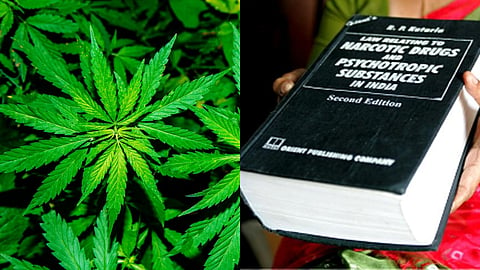
- HOMEGROWN WORLD
- #HGCREATORS
- #HGEXPLORE
- #HGVOICES
- #HGSHOP
- CAREERS
- ABOUT US
- CONTACT US

Lord forbid the day does not come but imagine you get caught by the long arm of the law with a bag of weed in your back pocket. What happens then? Are you aware of your legal rights? Do you know the permissible limits of possession? Today, we take a deeper look into the marijuana laws of our country to better understand the (il)legality of the cannabis culture in India.
But before we go into the code of laws, let us sort out our terminologies. The cannabis or marijuana plant is often incorrectly addressed synonymously with its different parts. Each part of the plant is different, has unique names, and varied usage. Charas refers to the separated resin of the cannabis plant, while bhang is the liquid form of cannabis made from its seeds. 'Ganja' refers to the flower of the female cannabis plant while hemp refers to the fibers and stalks of the cannabis plant. These different parts have been used for various purposes, including religious rituals, medicinal applications, industrial and recreational use.
The West is largely responsible for cannabis culture permeating the country’s youth. Global icons like Snoop Dog are never shy of encouraging folks to light that doobie up and movies like Pineapple Express are always reinforcing the cool quotient of cannabis in the global cultural zeitgeist. However, cannabis usage in India can be traced back to its mythical past. The cannabis plant has been deeply interwoven with Hindu spirituality and Indian culture for thousands of years. It has been and continues to be used in rituals as it is believed to induce a state of transcendence and spiritual connection. The most commonly used form of cannabis in India is bhang, which is used to make 'Thandai', a milkshake laced with cannabis seeds and leaves, consumed during Hindu festivals such as Holi and Shivratri, the Sikh festival of Hola Mohalla, and other religious festivals.
As we stepped away from our mythic past and ushered in modernity, came the existence of laws governing the cannabis plant. The history of marijuana laws in India dates back to the introduction of the Narcotic Drugs and Psychotropic Substances Act (NDPS Act) in 1985. This act prohibits the sale and production of cannabis resin and flowers, but allows for the use of leaves and seeds of the cannabis plant, with the states having the power to regulate and form the state rules for it. The legal status of marijuana in India is complex, with different states having their own rules and amendments, leading to variations in enforcement and penalties. For example, Odisha is a state in which weed is legal in India and people recreationally smoke it within the state’s territory. On paper, in the rest of India, weed is illegal. Recently India's first cannabis clinic opened in Bangalore but that does not make it legal country-wide. It is funny, however, that weed paraphernalia like chillums, rolling paper and bongs are proudly displayed at local shops and sold online very much legally in India. Irony, much?
But coming back to base reality. According to the NDPS Act, even possession of a small quantity of weed (even if it's a bag of stems and seeds with stuff just enough for a slim spliff) can land you in prison for six months to one year or/and a fine up to ₹ 10,000. The time of imprisonment and fine scales with the quantity in your possession and varies upon individual States. If it crosses 1000 grams for weed and 100 grams for charas, it is no longer considered a ‘small quantity’ and falls under ‘commercial quantity’. Then, the court can serve stern imprisonment for up to twenty years and a fine of two lakh rupees. In the case of illegal cultivation, a fine of up to one lakh rupees and rigorous imprisonment of up to 10 years can be levied.
In recent years, there have been ongoing discussions and movements related to the legalization of marijuana in India. Some states, such as Uttarakhand, have taken steps to allow commercial cultivation of hemp, recognizing its potential economic and environmental benefits. Additionally, organizations like the Great Legalization Movement India (GLM India) have advocated for the legalization of cannabis for its medicinal and industrial uses. There have been legal challenges and petitions, with some high courts considering the arbitrary nature of the NDPS Act's restrictions.
The debate around the legalization of marijuana in India has sparked discussions about its potential benefits and drawbacks. Proponents argue that legalizing cannabis could lead to economic growth, job creation, and the development of a regulated industry. They also highlight the medicinal and therapeutic potential of cannabis, especially in the context of increasing interest in cannabidiol (CBD) for various health conditions such as treating chronic pain, glaucoma, PTSD, epilepsy and more. On the other hand, concerns about potential misuse, addiction, and public health implications have also been raised. There have been proven studies where long-term marijuana users have experienced depression, loss of sensory orientation and in some extreme cases, schizophrenia.
As India continues to grapple with the complex and multifaceted issue of marijuana laws, it is essential to consider the cultural, religious, economic, and public health aspects of cannabis use and regulation. The ongoing dialogue and legal developments reflect the evolving societal attitudes and the need for a balanced and informed approach to address the complexities surrounding marijuana laws in India. All that being said, let us remember that legalization and decriminalization are not the same things. While pop culture and mythologization may make the cannabis plant seem like a pure gateway to peace and happiness or even a thing of divinity, we should ignore all that hippie propaganda and realize that it is a powerful psychoactive substance. As a country, we must weigh our options carefully before amending the NDPS Act or bringing in new regulatory marijuana laws.
